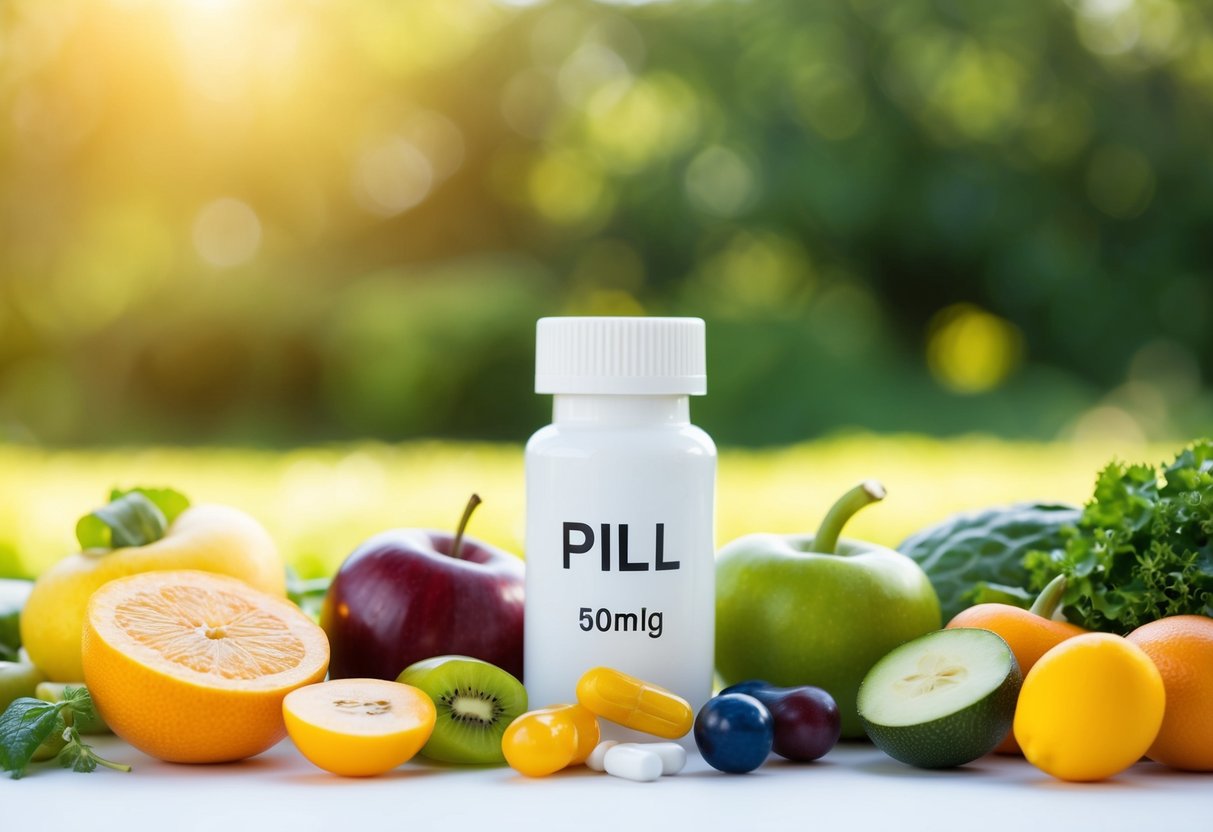The Impact of Lifestyle on Medication Efficacy
Medication efficacy can significantly be influenced by lifestyle choices. While medications are designed to work in predictable ways, factors like diet, exercise, and habits can alter their effectiveness. Simple lifestyle adjustments may improve drug responses, leading to better health outcomes.

Diet and physical activity play a critical role in modulating how drugs are processed by the body. Aging, smoking, and even weight changes can impact how well medications perform. Knowing these effects helps patients make informed decisions about their lifestyle that could optimize their treatment.
A patient’s behavior and health management are essential in maximizing medication benefits. Building a trust-based relationship with healthcare providers and understanding the personal roles in managing health can enhance therapy success. As individuals learn more about these interactions, they gain control and responsibility over their health outcomes.
Key Takeaways
- Lifestyle changes can improve medication efficacy.
- Diet, activity, and habits affect drug responses.
- Patient-provider trust boosts health management.
Foundations of Medication Efficacy
Medication efficacy depends on several factors, including biological mechanisms and how drugs are absorbed and utilized in the body. These elements are crucial to understanding why medications work differently in various individuals.
Biological Mechanisms
Biological mechanisms play a crucial role in determining how a medication affects the body. These mechanisms often involve receptors, enzymes, and ion channels. They interact with the drug to produce therapeutic effects or side effects.
The interaction between a drug and its target can influence the efficacy of the medication. For instance, genetic variations can alter receptor function, leading to different responses to the same drug among individuals. This means some may require higher or lower doses to achieve optimal effects.
Metabolic pathways are also important. Enzymes that metabolize drugs can vary in activity due to genetic factors or lifestyle choices such as diet and exercise. As a result, understanding these pathways can optimize medication regimens for better efficacy and reduced side effects.
Pharmacokinetics and Pharmacodynamics
Pharmacokinetics involves the movement of drugs through the body, including absorption, distribution, metabolism, and excretion. Factors such as age, weight, and organ function can impact these processes, affecting drug levels in the bloodstream and therapeutic outcomes.
Pharmacodynamics focuses on how drugs affect the body at their site of action. It involves the drug’s potency, efficacy, and potential to cause side effects. This area examines the relationship between drug concentration and effect, helping predict optimal dosage and timing.
Both pharmacokinetics and pharmacodynamics are crucial for determining the right drug dosage and schedule. They guide clinicians in tailoring treatments that maximize benefit while minimizing risks, making individual variability an essential consideration in medication management.
Lifestyle Factors Affecting Medication Efficacy
Lifestyle choices can change how well medications work. Elements like diet, exercise, sleep, and substance use play significant roles. Adapting these can influence how medications are absorbed, metabolized, and eliminated by the body.
Diet and Nutrition
Diet impacts how medications are absorbed and metabolized. Certain foods can speed up or slow down these processes. For example, grapefruit juice affects the breakdown of some drugs, altering their effectiveness. High-fat meals may delay absorption, while protein-rich foods might enhance it. Additionally, a balanced diet supports overall health, indirectly affecting medication responses.
Nutrient deficiencies can weaken drug efficacy. For instance, low levels of magnesium or potassium may interfere with heart medications. Vitamins and minerals support enzymatic processes crucial for drug metabolism. Patients might need to adjust their diet according to specific medications and recommendations from healthcare providers.
Physical Activity and Exercise
Exercise can change how the body processes medications by affecting metabolic rates. Active individuals often metabolize drugs faster, which can require adjustments in dosing. Increased blood flow from exercise may enhance drug delivery to tissues, enhancing efficacy. However, strenuous activities might also increase side effects in some medications.
Body composition changes through regular physical activity, impacting drug distribution and elimination. Those with higher muscle mass may metabolize certain medications differently compared to individuals with higher body fat. Managing physical activity levels helps maintain ideal drug efficacy and reduces potential adverse reactions.
Sleep Quality and Patterns
Sleep affects many body systems, including those responsible for processing medications. Poor sleep quality can disrupt hormonal balances and affect how drugs are metabolized. Consistent sleep patterns enable the body to effectively metabolize and eliminate medications, optimizing their effects.
Sleep disorders like insomnia or sleep apnea may demand adjustments in medication timing or dosing. Medications meant to be taken at specific times may work best if aligned with the body’s natural sleep-wake cycles. Addressing sleep issues is vital for maintaining optimal medication efficacy and reducing side effects.
Substance Use and Exposure
Substance use, including alcohol and smoking, can significantly alter drug metabolism. Alcohol consumption might interfere with liver enzymes, affecting how drugs are processed. Smoking induces specific enzymes that can hasten the breakdown of certain medications, reducing their efficacy.
Environmental exposures like pollution might also play a role in drug metabolism. External chemicals can interact with medications, causing unpredictable effects. Patients must be aware of these interactions and adjust their lifestyle accordingly. Reducing substance use and being cautious of environmental exposures can help maintain the intended effectiveness of medications.
Clinical Implications
Lifestyle changes can significantly influence how medications work in the body. This affects both personalized medicine, which tailors treatment to individuals, and how well patients follow their treatment plans.
Personalized Medicine
Personalized medicine looks at how different people respond to drugs based on many factors, including lifestyle. Diet and exercise can change drug responses by affecting absorption, distribution, metabolism, and excretion. For example, active individuals may metabolize certain drugs faster, requiring dose adjustments.
Obesity can also alter drug pharmacokinetics. Recent studies show that lifestyle medicine can improve outcomes in chronic diseases by integrating personalized approaches. Understanding individual lifestyle factors helps healthcare providers optimize drug therapy, ensuring maximum efficacy and minimal side effects.
Adherence and Compliance
Medication adherence is crucial for treatment success. Lifestyle modifications can improve or hinder adherence. Patients who feel autonomous are more likely to follow medication plans. This sense of control can be fostered through collaborative discussions with healthcare providers.
Structured lifestyle interventions, such as diet and exercise programs, have had positive effects on maintaining medication routines. However, barriers like complicated regimens or lack of support can decrease compliance. Addressing these barriers through education and support can enhance adherence, leading to better health outcomes and more effective medication use.
Frequently Asked Questions
Lifestyle choices can have a big impact on medication effectiveness. Factors like diet, exercise, and daily habits can influence how drugs work in the body. Understanding these connections can help in achieving better therapeutic outcomes.
How does diet influence the effectiveness of prescribed medications?
Diet can significantly alter drug effectiveness. Certain foods can affect how drugs are absorbed or metabolized. For instance, grapefruit juice can increase or decrease the levels of some medications in the bloodstream by interacting with drug-metabolizing enzymes.
Can physical activity levels affect how drugs are metabolized by the body?
Yes, physical activity can change the way drugs are metabolized. Regular exercise can improve circulation and metabolism, potentially impacting the rate at which drugs are processed. This can alter drug levels in the body, affecting their efficacy and safety.
In what ways can lifestyle changes complement or interfere with medication therapy?
Lifestyle changes such as improved diet or increased exercise can enhance medication therapy, helping drugs work more effectively. Yet, some changes may interfere with drug action. For example, significant weight loss might require a dosage adjustment, while alcohol consumption can hinder medication effectiveness.
Which lifestyle factors are known to significantly impact the therapeutic outcomes of drug treatments?
Several lifestyle factors can impact therapeutic outcomes. Smoking, alcohol consumption, stress, and sleep patterns can all affect drug metabolism and efficacy. For instance, smoking can alter the metabolism of some medications, leading to reduced effectiveness or increased side effects.
How can the speed of drug metabolism be affected by environmental and behavioral factors?
Environmental and behavioral factors like exposure to pollutants, stress, and routines can influence drug metabolism speed. Exposure to certain environmental chemicals may upregulate or downregulate enzymes that metabolize drugs, while stress can affect hormone levels, altering drug efficacy.
Conclusion
Lifestyle choices, like diet, exercise, and habits such as smoking, influence how medications work in the body. A balanced diet can improve drug effectiveness, while inconsistent eating may reduce it. Regular exercise may enhance the benefits of some medications, especially for heart health. Discussing lifestyle habits with healthcare providers can help ensure that routines support prescribed treatments, leading to better health outcomes.









